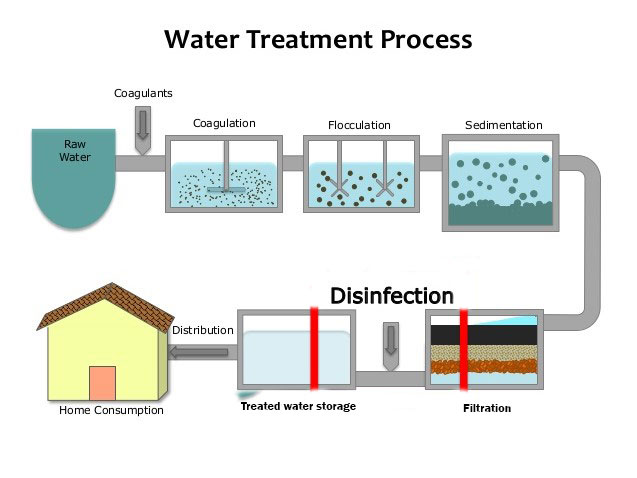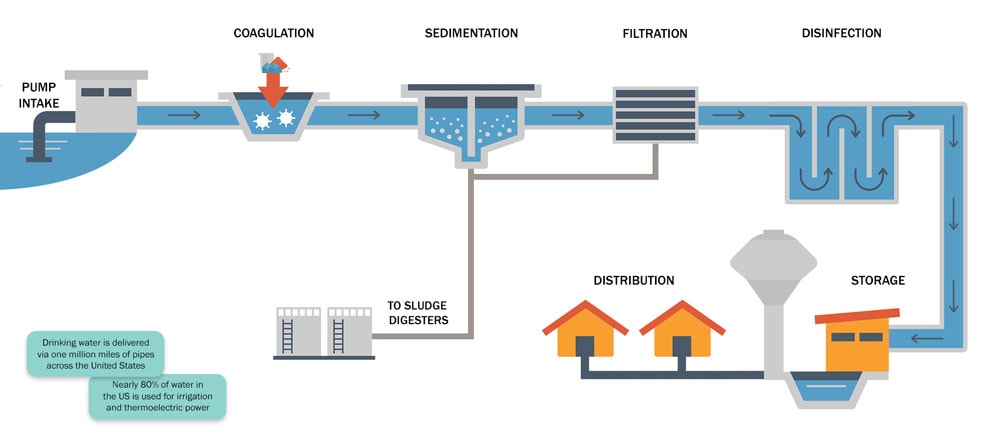Discovering Water Technology Startups: How They Change Sustainable Solutions
Water Technology startups are emerging as critical gamers in the quest for sustainable remedies to international water problems. These firms take advantage of cutting-edge innovations to improve water effectiveness and administration. Their contributions address pressing obstacles such as deficiency and contamination. Nevertheless, despite their possibility, they face numerous obstacles that can influence their success. Recognizing these dynamics clarifies the future of water sustainability and the duty these start-ups might play fit it.
The Relevance of Water Technology in Today's World
As global water deficiency intensifies, the importance of water Technology becomes increasingly obvious. Water Technology plays a crucial duty in attending to the difficulties posed by lessening freshwater sources and raising need. It incorporates a broad series of technologies, consisting of advanced filtering systems, wastewater therapy modern technologies, and clever watering services. These innovations not just enhance the efficiency of water use but also promote lasting techniques throughout numerous industries, including farming, sector, and metropolitan growth.
Furthermore, the importance of water Technology expands past resource monitoring. It cultivates strength against climate adjustment influences, such as floodings and dry spells, by supplying flexible options for water preservation and administration. In addition, it supports public health by guaranteeing accessibility to tidy and risk-free alcohol consumption water. As the world faces growing water-related difficulties, the combination of advanced water innovations is necessary for promoting sustainable growth and securing water schedule for future generations.
Cutting-edge Solutions From Water Tech Startups
While traditional strategies to water administration have served their purpose, a new wave of water tech startups is transforming the market with cutting-edge options (Water Technology Startups). These business leverage advanced innovations to attend to pushing water issues, such as deficiency, contamination, and ineffective circulation. Several start-ups make use of expert system and artificial intelligence to enhance water usage and forecast demand, leading to even more lasting methods
In addition, a number of companies focus on establishing advanced filtration systems that eliminate contaminants and make water risk-free for consumption. Others explore decentralized water treatment modern technologies, allowing neighborhoods to handle their water resources better. Additionally, some startups are pioneering wise watering options that decrease water waste in agriculture, advertising ecological conservation.
Case Researches: Successful Water Technology Startups
Various water Technology startups have actually arised as leaders in dealing with worldwide water difficulties with cutting-edge techniques. One significant example is Xylem, which concentrates on water analytics and wise framework to maximize water use and minimize waste. Their services have actually been carried out in different municipalities, demonstrating substantial improvements in water monitoring performance.
An additional successful startup, No Mass Water, has actually developed solar-powered hydropanels that draw out water vapor from the air, offering sustainable alcohol consumption water in dry regions. Water Technology Startups. This Technology has been deployed in numerous nations, making sure communities have access to tidy water
AquaVenture Holdings runs a diverse portfolio of water-as-a-service solutions, attending to water shortage with desalination and wastewater treatment. Their jobs have shown necessary in areas facing severe water scarcities, showcasing the possibility of cutting-edge water modern technologies to produce enduring, positive influences. These study highlight the transformative capacity of startups in the water Technology sector.
The Duty of Smart Technology in Water Administration
Smart Technology plays a necessary duty in modern-day water monitoring by leveraging IoT applications to enhance resource use. Information analytics improves efficiency by providing actionable understandings, while remote tracking services make it possible for real-time oversight of water systems. With each other, these advancements transform exactly how water is managed, advertising sustainability and operational effectiveness.
IoT Applications in Water
As water deficiency and administration challenges escalate worldwide, the integration of Web of Things (IoT) applications has actually become a crucial option in enhancing water sources. IoT Technology helps with real-time monitoring and evaluation of water systems, enabling much more reliable usage and monitoring. Sensors deployed in various water frameworks can track quality, flow prices, and leakage, supplying important data to stakeholders. This information empowers energies and customers to make informed decisions, reducing waste and enhancing preservation initiatives. Additionally, wise watering systems make use of IoT to optimize water distribution for agriculture, ensuring that crops get the correct amount of water at the correct time. In general, IoT applications are transforming standard water administration practices, promoting sustainability and durability in water source systems.
Information Analytics for Performance
Using information analytics is essential for improving efficiency in water monitoring. Water Technology start-ups are increasingly using innovative analytics to maximize source appropriation and reduce waste. By analyzing data from numerous sources, these startups can identify patterns and patterns that notify website much better decision-making. Predictive analytics can forecast water demand, enabling utilities to readjust supply as necessary, therefore lessening shortages and excess. Furthermore, real-time data processing enables the immediate detection of leakages and inefficiencies within distribution systems, substantially minimizing operational costs. Moreover, data-driven understandings encourage stakeholders to implement targeted preservation methods, fostering lasting methods. Basically, incorporating information analytics right into water administration not just streamlines operations but likewise advertises long-term sustainability in water source usage.
Remote Surveillance Solutions
While traditional water monitoring systems often deal with inadequacies, remote tracking solutions are changing just how water resources are taken care of. These innovative innovations enable real-time data collection and evaluation, allowing stakeholders to keep an eye on water quality, circulation rates, and use patterns from afar. Using sensors and IoT gadgets, remote monitoring provides prompt understandings that facilitate positive decision-making. This change not just enhances functional effectiveness yet also promotes sustainability by lowering water waste and optimizing resource allowance. In addition, remote monitoring systems can recognize prospective concerns prior to they intensify, therefore reducing the danger of contamination or framework failing. As water Technology start-ups remain to develop these services, the sector is positioned for considerable advancements in sustainable water administration methods.
Obstacles Encountering Water Technology Startups
Water Technology startups encounter considerable challenges that can impede their growth and success. Secret problems consist of protecting ample financing, steering through complicated regulative atmospheres, and contending in a congested market. These challenges need calculated preparation and innovation to conquer.
Funding and Investment Hurdles
Although advancement in water Technology holds enormous capacity for resolving global challenges, startups in this market usually encounter substantial financing and investment obstacles. Numerous investors stay mindful, perceiving the water industry as high-risk as a result of its complicated governing landscape and long growth timelines. Furthermore, start-ups usually battle to demonstrate prompt profitability, which can hinder possible backers. Traditional endeavor resources might neglect water modern technology, preferring industries with quicker returns, such as tech or durable goods. Furthermore, safeguarding grants and federal government funding can be time-consuming and affordable, further making complex financial security. Water Technology Startups. As a result, many ingenious water Technology startups locate themselves in a precarious position, calling for innovative financing techniques to navigate these economic obstacles and achieve their goals
Governing Compliance Issues
Guiding governing compliance is a significant obstacle for start-ups in the water Technology industry, as they need to grapple with a myriad of local, nationwide, and global regulations. These laws commonly incorporate water quality requirements, environmental management regulations, and safety procedures, which can vary commonly throughout territories. Start-ups may discover it hard to browse this facility landscape, particularly when scaling operations or getting in new markets. The expenses connected with conformity can be significant, drawing away sources far from technology and product development. Additionally, hold-ups in getting essential authorizations or qualifications can hinder development and market entry. A robust understanding of regulatory frameworks is vital for these start-ups to assure sustainable operations and prevent potential lawful effects.
Market Competitors Dynamics
As water Technology startups emerge in an affordable landscape, they encounter many challenges that can impede their development and advancement. Developed business frequently dominate the market, leveraging resources and experience to keep their settings. Startups battle with minimal funding, which restricts study and advancement capabilities, making it hard to contend on Technology and pricing. In addition, the quickly developing nature of water technologies demands consistent adaptation, more stressing startup sources. Regulative difficulties can complicate market access, as compliance with ecological standards is essential yet costly. Bring in proficient talent in a specific niche area offers another obstacle, as larger companies might provide even more enticing employment packages. Subsequently, these elements develop a complex atmosphere for water Technology start-ups aiming to prosper.

The Future of Water Technology and Sustainability

The future of water Technology will likely focus on incorporating synthetic intelligence and data analytics to maximize water distribution and usage patterns. By harnessing real-time data, business can anticipate lacks and take care of resources extra successfully. Moreover, sustainable practices will certainly come to be a cornerstone of the sector, urging circular economic situations where water is reused and dealt with. Eventually, the ongoing development of water Technology will be important in developing durable infrastructures with the ability of meeting the difficulties posed by environment change and populace growth while promoting ecological stewardship.
Often Asked Questions
What Are the Trick Metrics for Assessing Water Technology Startups?
Trick metrics for evaluating water Technology startups consist of market possibility, scalability, customer procurement prices, income development, modern technology development, regulative conformity, ecological impact, competitive advantage, and team expertise, all vital for establishing long-term practicality and success.
Just How Can Individuals Support Water Technology Innovations?
People can support water Technology advancements by spending in startups, advocating for policy modifications, taking part in area campaigns, sharing expertise concerning lasting techniques, and advertising recognition of water concerns via neighborhood occasions and social media.
What Prevail Financing Sources for Water Tech Startups?
Common funding resources for water technology startups consist of financial backing, government grants, crowdfunding systems, angel investors, and company collaborations. These monetary avenues help facilitate development and advancement in sustainable water administration technologies.

Which Industries Advantage Many From Water Technology Advancements?
Industries such as agriculture, power, production, and metropolitan services profit significantly from water Technology advancements. These advancements enhance water performance, decrease prices, and promote lasting practices, inevitably adding to environmental conservation and source administration.
Are There Any Type Of Governing Challenges Specific to Water Innovation?
Yes, water Technology encounters governing obstacles, including conformity with ecological requirements, permitting processes, and varying local guidelines. These intricacies can hinder development and slow the execution of new modern technologies in the water monitoring sector.
Water Technology startups are arising as essential players in the quest for sustainable services to global water issues. As global water shortage intensifies, the relevance of water Technology ends up being progressively obvious. Others explore decentralized water therapy innovations, enabling areas to manage their water sources extra properly. Another effective start-up, No Mass Water, has actually created solar-powered hydropanels that extract water vapor from the air, providing sustainable drinking water in arid regions. Their projects have shown necessary in areas encountering extreme water scarcities, showcasing the possibility of cutting-edge water modern technologies to produce enduring, favorable effects.